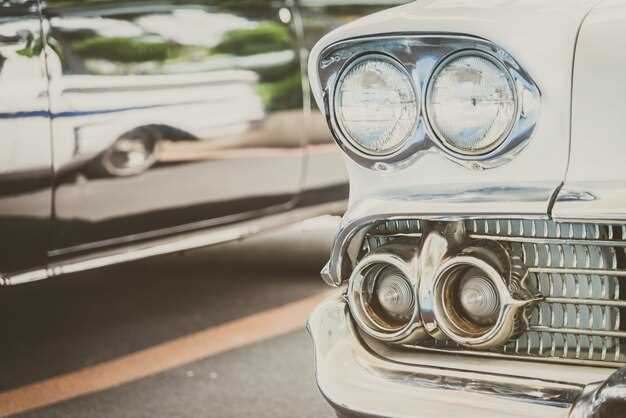
Investing in a classic car can be an exciting venture, but it involves careful consideration of several key factors. The allure of these timeless vehicles often lies not only in their design and history but also in the experience of ownership. However, before making a purchase, potential buyers must navigate a landscape filled with various considerations.
One of the most critical steps in the process is a thorough inspection of the vehicle. Unlike modern cars, classic cars may have hidden issues that can lead to costly repairs down the line. Understanding the car’s mechanical condition, bodywork, and overall integrity is essential. A comprehensive inspection can help identify these concerns, ensuring that buyers are fully informed about their investment.
Additionally, buyers should consider the provenance and documentation of the classic car. A well-documented history can significantly enhance the vehicle’s value and provide insights into its past repairs and modifications. Knowing the full story behind a classic car not only adds to its charm but also aids in making a more informed purchasing decision.
Understanding the Importance of a Professional Inspection
When buying a classic car, one of the most crucial steps is to secure a professional inspection. Classic cars can possess hidden issues that may not be apparent to the untrained eye. An experienced inspector can identify problems related to the vehicle’s structure, engine, transmission, and other critical components.
A professional inspection typically covers a comprehensive assessment of the car’s condition. This includes checking for rust, bodywork imperfections, and signs of previous accidents. By addressing these concerns upfront, potential buyers can avoid costly repairs and make informed decisions.
Furthermore, classic cars often have unique characteristics and components that require specialized knowledge. A mechanic who understands these intricacies will be better equipped to evaluate whether the car is a worthwhile investment or a potential money pit. They can also verify the authenticity of parts, which is essential for maintaining the vehicle’s value.
Additionally, having a detailed inspection report can provide negotiating leverage. If significant issues are discovered, buyers may be able to negotiate a lower price or request that the seller complete necessary repairs before the sale is finalized. This process not only helps ensure that you get a fair deal but also enhances your overall ownership experience.
In conclusion, a professional inspection is not merely a formality when buying a classic car; it is a fundamental step that safeguards your investment. Investing in this service can lead to peace of mind, knowing you are making a sound and informed purchase.
Evaluating the Authenticity and Documentation of Classic Cars

When buying a classic car, one of the most critical aspects to consider is the authenticity and documentation of the vehicle. Ensuring that a car is genuine significantly affects its value and desirability. Start with a thorough inspection of the vehicle’s identification numbers, such as the Vehicle Identification Number (VIN) and the engine number, which should match the original specifications for that model.
Researching the car’s history is essential. Documentation, including service records, previous sales receipts, and ownership history, can provide valuable insight into the vehicle’s past. Look for any restoration work that may have been done; genuine classic cars often have an unblemished provenance. Original parts and accessories can enhance the car’s value, so ensure that you verify their authenticity as well.
Consider seeking out reports from reputable classic car organizations or appraisers. These documents can affirm the vehicle’s historical significance and its condition, offering peace of mind when making your purchase. Additionally, being aware of any discrepancies in the documentation can provide foresight into potential issues that may arise in the future.
Ultimately, a comprehensive review of the authenticity and thorough documentation will equip you with the knowledge necessary to make a sound buying decision, ensuring that the classic car you select is both a reliable and valuable investment.
Assessing Maintenance Costs and Availability of Parts

When considering the purchase of a classic car, it is essential to assess both the maintenance costs and the availability of parts. These factors can significantly impact your overall ownership experience. Here’s how to evaluate them effectively:
- Research the Model:
Different classic car models have varying costs associated with their upkeep. Some cars are known for being reliable with low maintenance costs, while others may require frequent repairs. Investigate the model you are interested in to gather insights on typical maintenance expenses.
- Find a Trusted Mechanic:
A trusted mechanic with experience in classic cars is invaluable. Make sure you have access to someone who understands the specific needs of the vehicle you plan to buy. This will help you gauge potential labor costs more accurately.
- Inspect Parts Availability:
Check how easy it is to find replacement parts for the specific classic car you are considering. Some models have parts that are readily available, while others may require sourcing from specialty shops or online marketplaces.
- Evaluate Aftermarket Options:
Aftermarket parts can sometimes be a more affordable and accessible option. Research whether there is a strong aftermarket support for the car you’re interested in, as this can influence long-term maintenance costs.
- Join Enthusiast Groups:
Engaging with communities or forums focused on classic cars can provide insights into ownership experiences. Fellow enthusiasts can share tips on maintenance, cost management, and where to find parts.
- Consider Total Cost of Ownership:
Factor in not only the purchase price but also ongoing maintenance costs and availability of parts. Make a list of potential expenses you may encounter, including insurance and storage, to create a clear picture of the investment involved.
In conclusion, assessing maintenance costs and part availability is crucial when buying a classic car. By conducting thorough research and planning ahead, you can ensure a smoother ownership experience and avoid unexpected financial burdens.


